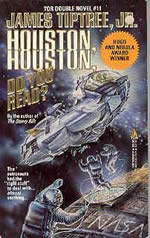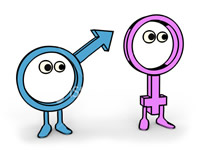
Can't Live with them, so We'll live Without them!: Women Only Worlds in Science Fiction
| Works of Literature | Authors | Motivation | Resources | Home |
|---|
"Houston, Houston, Do You Read?"

"Houston, Houston, Do You Read?" (1976) is a short story by Alice Sheldon, who wrote under the name James Tiptree, Jr. In the story, three astronauts from Earth on a space mission encountered unfamiliar spacecraft. The men, Lorimer, Dave, and Bud, were able to talk to the inhabitants using their radios, and they learned that they somehow leaped three hundred years into the future. While they were still processing this information, the inhabitants of the spacecraft tried to convince the men to board their ship because the men were running out of fuel and going in the wrong direction. The men reluctantly agreed that joining the other expedition was their best chance for survival.
Even before they boarded the ship, they had noticed that female voices greatly outnumbered male voices. When they joined the crew, they noticed only one male, Andy. They were greatly perplexed by the near absence of men. However, the women would not discuss in depth their culture or life on Earth three hundred years in the future.

Gradually, the men learned the truth about the future. A virus lessened the fertility of the inhabitants of Earth; the X chromosomes of most people were damaged. All reproduction ceased until men produced healthy sperm. However, all the male fetuses died because the women could not provide healthy X chromosomes. Gradually, the men died out, but the women remained because their healthy X chromosome compensated for the damaged one.
Some of the women accidently revealed the secret of their survival as a race: all of the women are clones. There were approximately 11,000 original women that were cloned repeatedly to produce the population of two million. The only "man" of the crew, Andy, was actually a women who had been treated with male hormones from a young age.

The men were amazed by the lack of men on the planet. Bud, who was a "ladies' man" when he lived on Earth, decided to try to take advantage of the situation after the women gave him a drug that loosened his inhibitions. He attempted to rape one of the women; however, the women collected his sperm and killed him. When Dave decried their society and behavior and proclaimed himself the prophet who came to save them, they killed him too.
At the end of the story, they sadly explained to Lorimer that he would have no place in society. They were happy without men; they were peaceful and productive. As the scene closed, Lorimer agreed and accepted the poison.
Analysis
The all-female society in "Houston, Houston, Do You Read?" is portrayed differently from the one in Russ' "When It Changed." While both stories feature the invasion of female-only societies by male space travelers, the two stories approach the situation from different viewpoints. In "When It Changed," a woman from the all-female world Whileaway narrates the story. On the other hand, "Houston, Houston, Do You Read?" is told from the perspective of the male astronauts who unwittingly stumble upon the single gender future of Earth.
The focus on the male astronauts changes the perspective of the story. The story reveals the flawed gender stereotypes that some men embrace. Bud, one of the astronauts was sexually promiscuous on Earth before his mission. While under the influence of the drug from the women, he found out that he and the other members of his team were the only men left on Earth. He became nearly delirious at the prospect of possessing all the women in the world with virtually no competition. "...Nothing but pussy everywhere. I can do anything I want, any time. They'll be spread out for miles, begging for it. Clawing each other for it. All for me, King Buddy" (Tiptree Jr. 89). This tirade reveals two facets of Bud's attitudes toward and relationships with women. First of all, Bud viewed women primarily as sexual objects for his enjoyment. He valued them only for the sexual pleasure they could provide. Furthermore, Bud believed that the women would be eager to submit to him; he thought that the women would be grateful for his sexual presence. He even fantasized about their adulation for his sexual organs.
As his egotistical fantasy escalated, he initiated sex with one of the women on the ship. He believed that he was in control of the sexual encounter; while he undressed her, he belittled her physical attributes. He vocally compared her features to those of the young, beautiful women he truly wanted. However, he did not realize that the women of the ship were manipulating him. Bud's potential sexual partner only allowed the encounter to continue until one of the other women collected his sperm; then they killed him.

Dave, another of the astronauts, viewed women as inferior creatures who required the guidance of men to accomplish anything. According to Dave, "Women are not capable of running anything...Look what they've done here, it's pathetic" (Tiptree Jr. 92). Despite Dave's prejudices, the women made great advances in technology; they continued the space missions and harnessed reproductive cloning to keep the population steady. Listening to Dave's arguments and observing the actions of the women, the reader realizes how narrow-minded Dave's beliefs about women are.
In "Houston, Houston, Do You Read?" James Tiptree Jr. challenges the sexist attitudes some men harbor toward women. By showcasing a successful society of women alongside the outdated prejudices, Tiptree shows how outlandish these attitudes are. Merely by existing, the female-only society showcased in the story discredited the old attitudes toward women.
Last Update: 3 Dec. 2009